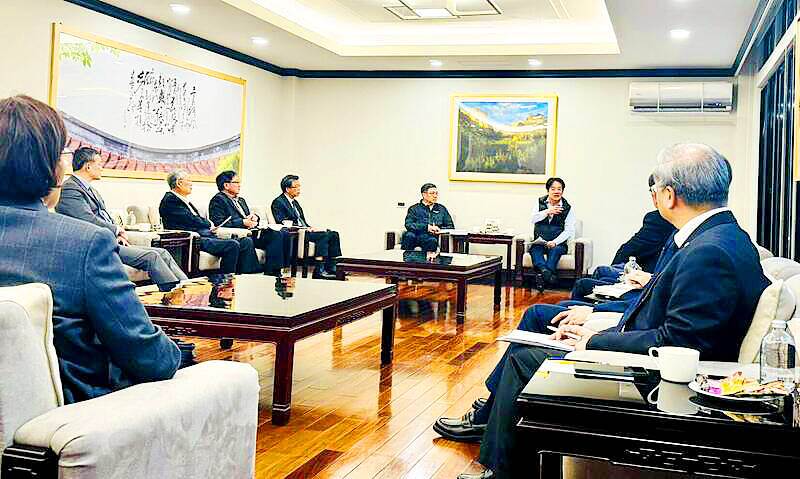President William Lai (賴清德) met with tech executives yesterday to discuss how to respond to the US’ tariffs, promising to ensure Taiwan’s global competitiveness and safeguard the nation’s interests.
US President Donald Trump on Wednesday announced sweeping “reciprocal tariffs” targeting several trade partners, including a 32 percent levy on products from Taiwan, set to take effect on Wednesday.
The US tariffs do not apply to semiconductors, a major Taiwanese export.

Photo courtesy of the Presidential Office
Lai met executives at his official residence to discuss how to respond to “the global economic and trade challenges brought about by the reciprocal tariff policy,” Presidential Office spokesperson Karen Kuo (郭雅慧) said in a statement.
“Lai hopes to give the industry the greatest support, stabilize the economic situation, ensure Taiwan’s global competitiveness, and safeguard our country’s national interests and the continued steady progress of our economy,” Kuo said.
Representatives from the information and communications technology industry who attended the meeting included Hon Hai chairman Young Liu (劉揚偉), Kinpo Group chairman Rock Hsu (許勝雄), Wistron president Jeff Lin (林建勳), Taiwan Electrical and Electronic Manufacturers’ Association chairman Richard Lee (李詩欽), Pegatron Group chairman Tung Tzu-hsien (童子賢), Acer Group founder Stan Shih (施振榮) and chairman Jason Chen (陳俊聖), Asus Group co-chief executive officer Samson Hu (胡書賓), AUO Corp chairman Paul Peng (彭雙浪), who is also chairman of the Taipei Computer Association, and Taiwan Semiconductor Manufacturing Co vice president Cliff Hou (侯永清), who is also chairman of the Taiwan Semiconductor Industry Association.
A source said on condition of anonymity that attendees reached a consensus that the government should not take action without a clear plan.
Countries responded differently to the tariffs — revenge, submission or compromise — but further observation is required, as challenges posed to each country are different and Washington has yet to make final decisions, the source said.
Attendees agreed that the government should not enter negotiations without bargaining chips and there was no need to rush into a showdown, while offering assurances to affected sectors, the source added.
Lai and Premier Cho Jung-tai (卓榮泰) are today to meet with representatives from traditional industries and heads of micro, small and medium enterprises to hear the views and needs of frontline companies, the source added.
Separately, Cho yesterday met with Central Bank Governor Yang Chin-long (楊金龍), Financial Supervisory Commission Chairman Peng Jin-lung (彭金隆) and Minister of Finance Chuang Tsui-yun (莊翠雲) to discuss measures to stabilize financial markets, the Cabinet said.
A source from the Cabinet did not say whether the meeting involved discussions on activating the National Financial Stabilization Fund — a mechanism designed to support the Taiwan Stock Exchange during periods of economic volatility. The fund could be convened at any time after the financial markets reopen tomorrow.
Taiwan’s markets have been closed since Thursday for the Tomb Sweeping Day and Children’s Day holidays.
Premier Cho Jung-tai (卓榮泰) on Friday urged the public to prepare for potential market turbulence following the implementation of US President Donald Trump’s so-called “liberation day” tariffs.
Additional reporting by Chung Li-hua and CNA

A small number of Taiwanese this year lost their citizenship rights after traveling in China and obtaining a one-time Chinese passport to cross the border into Russia, a source said today. The people signed up through Chinese travel agencies for tours of neighboring Russia with companies claiming they could obtain Russian visas and fast-track border clearance, the source said on condition of anonymity. The travelers were actually issued one-time-use Chinese passports, they said. Taiwanese are prohibited from holding a Chinese passport or household registration. If found to have a Chinese ID, they may lose their resident status under Article 9-1

Taiwanese were praised for their composure after a video filmed by Taiwanese tourists capturing the moment a magnitude 7.5 earthquake struck Japan’s Aomori Prefecture went viral on social media. The video shows a hotel room shaking violently amid Monday’s quake, with objects falling to the ground. Two Taiwanese began filming with their mobile phones, while two others held the sides of a TV to prevent it from falling. When the shaking stopped, the pair calmly took down the TV and laid it flat on a tatami mat, the video shows. The video also captured the group talking about the safety of their companions bathing

A classified Pentagon-produced, multiyear assessment — the Overmatch brief — highlighted unreported Chinese capabilities to destroy US military assets and identified US supply chain choke points, painting a disturbing picture of waning US military might, a New York Times editorial published on Monday said. US Secretary of Defense Pete Hegseth’s comments in November last year that “we lose every time” in Pentagon-conducted war games pitting the US against China further highlighted the uncertainty about the US’ capability to intervene in the event of a Chinese invasion of Taiwan. “It shows the Pentagon’s overreliance on expensive, vulnerable weapons as adversaries field cheap, technologically

Starting on Jan. 1, YouBike riders must have insurance to use the service, and a six-month trial of NT$5 coupons under certain conditions would be implemented to balance bike shortages, a joint statement from transportation departments across Taipei, New Taipei City and Taoyuan announced yesterday. The rental bike system operator said that coupons would be offered to riders to rent bikes from full stations, for riders who take out an electric-assisted bike from a full station, and for riders who return a bike to an empty station. All riders with YouBike accounts are automatically eligible for the program, and each membership account